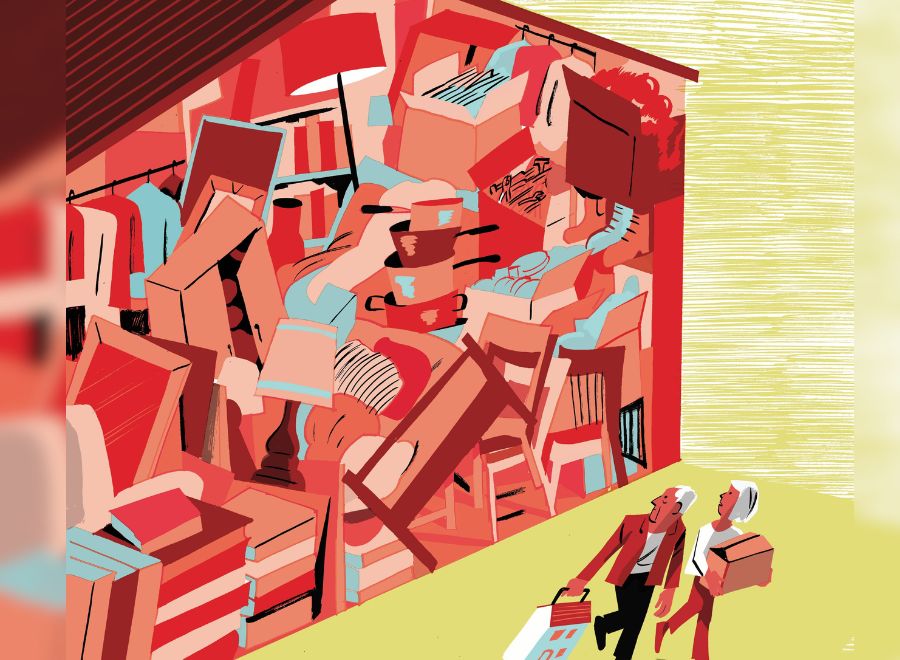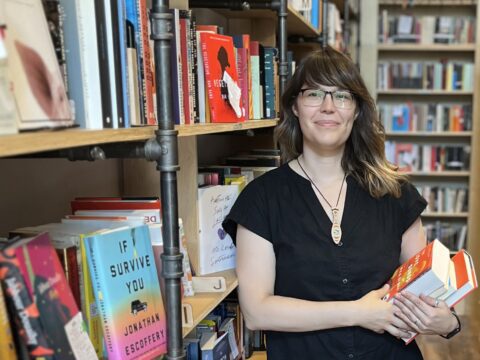When my wife and I told the woman in the bank lineup that we were selling our house and moving into an apartment, her response was typical of many. She was from our church and had walked right up to us and asked how we were doing. Quite frankly, we were exhausted. We had long been angling toward a decision to sell our house and move — we didn’t know where. Now that we were listing the place and going full speed on downsizing, we were beat. We told her so, and why.
I might as well have said we had COVID-19 the way she leapt away from us. “No, no, I couldn’t do that,” she declared. “I wouldn’t be able to do that to my husband.” Apparently, her husband really did need a place to tinker with his projects. Moving wasn’t an option. Then she got away from us. Others of our acquaintance gave similar reasons for not moving: “We need the space.” “The grandchildren count on our house.” “I don’t think I’m ready for that kind of thing, yet.”
You may unsubscribe from any of our newsletters at any time.
A woman from our tai chi class was particularly forthright: “I can’t live without my stuff.” I loved her answer. It was so nakedly honest. That’s exactly the immense problem we were up against: what to do with all this stuff. How had we filled our house so fully and completely with it?
One whole wall of the basement was given over to Christmas paraphernalia. Boxes and boxes of it, hauled out every December and up the stairs to become part of our decorated house. Then, the first of January, down it all came, packed back, somehow, into those boxes and hauled to the basement again. We had a house, so it all fit.
So did the books I brought home from the local newspaper where I reviewed for 40 years. Every time the books started to pile up, no problem, buy another shelf and ring the rec-room with them.
Then there were the paintings. We supported local artists, we proudly told ourselves, so the walls were covered with gorgeous works. It was a mini-gallery.
And our closets, mine particularly, bulged with clothes. I didn’t care for shopping, so when I found a few shirts or shorts I liked, I bought them all and jammed them in. But now the reckoning had come.
More on Broadview:
- How boomers are personalizing their last chapter
- How minimalism can improve your life
- Swedish tradition of death cleaning explained
Why did we have to move, anyway? Why couldn’t we just stay in our lovely, modest dwelling in a safe, quiet area with neighbours we loved? Why not just get rid of all this overflow and live here minimally and comfortably? Really, nearly all our friends were in the same situation, many with much more stuff, and they weren’t going anywhere soon.
We’d thought our way through that possibility. Aging in place, some call it. My wife did a projection of what it would cost us to stay in the house and live there another 15 years into our 80s, barring a fall or other complication and doing what our son suggested and hiring seasonal help. Well, new garage, new driveway, fresh coat of paint inside and out, and so on. There went $150,000 at least. So, we decided it was time.
We had two models for moving: one, a couple our age who’d sold their bed and breakfast and moved into a basement suite that they alternated with winters in Mexico; and a single man in his mid-70s who’d had enough of house upkeep. He bought a condo. Both said the downsizing, particularly, and then the move would be hellish, but the outcome would be worth it.
Now we’re months into an apartment looking out at a whole new view, and, except for a late-30s divorce, I have never been through such a challenging thing in my life. No wonder all our boomer friends did a quick avoid when they saw us coming. It was hard to go through all that stuff, all those possessions, many of them lovingly acquired, and make all these decisions about what to do with them.
One guy laughed at our efforts and said, “I’m leaving it all to my kids to handle.” Lucky them. That was another big part of the equation for us: could we leave it all to our kids? Answer, no. For us, it would mean that one person, a single-parent mom, would do most of the work and out-of-towners would promise to be there.
I had watched my own mother deal with her mother’s possessions after she died, several provinces away. When she and my dad eventually moved into assisted living, my siblings and I all had to come home to our small town to clear out the place. What do you do with a set of encyclopedias and a piano?
The equivalent for us was books and CDs. CDs are obsolete technology for many, and books, like gold to us all our lives, seem to have wandered off after the dodo.
I invited grad students and members of the writing community to come by and grab whatever books they wanted. Even then, I took thousands to a bookstore that accepted everything with my understanding that much of it might just go to charity book sales. No problem. What they gave me in credit I donated to students.
And that’s just one example of how much work it took to pass on one portion of what we had in our house.
I’m in the last third of my life. I don’t want to spend it as a curator in the museum of my things.
People regaled us with all sorts of fantasies about the money we’d make from our things or the fun we’d have at our big garage sales. If anybody tells you you’re going to make millions on the amazing stuff you have lodged away in your house, and it’s not gold bricks, ask them to do the marketing for you and you’ll give them half the proceeds. Then watch them run the other way.
And if you think that donating everything is easier than selling it on some fantastic social media platform someone knows is a surefire thing, it isn’t. We gave it all away to various charities, relief organizations, friends, relatives, people in need, and it took Herculean effort to match the item with the right person.
I could see why some people just rented a dumpster and threw it all in. But that’s such a cop-out. It’s shirking our responsibility to avoid crowding the landfill with our stuff and a missed opportunity to see that people in need get some use out of things we no longer want.
When I looked at the empty shelves in my office, to say nothing of the bare rec-room walls where I’d dispensed with seven bookshelves, I had a reverie of the energy I’d kept trapped in those books for all those years I’d owned them. All those stories, characters and ideas locked away in my house. Sure, as a teacher and writer, books were my tools, but truth be told, many had become a kind of intellectual wallpaper, markers of where I’d been as a student and reader.
And then there were the tools themselves, a wall of them in the back basement. How many did I honestly use anymore: 10 in a year? A friend of mine who’s a real handyman took them willingly. He’s good at putting tools in the hands of those who need them.
As for the furniture, family took some, and refugees fleeing some sort of hell on earth took most of the rest. I remember one evening a very long van pulling up and a big man and his son getting out, with a woman and her small daughter. She’s from Ukraine, he told us, here a month. Can’t speak English. We hauled a couch and easy chair out of the basement, a couple of end tables and a vase, at which she almost smiled.
Then she said something to him, and he asked us, “Do you have a lamp? It’s dark in her place. No light.” My wife went running back into the house and emerged with one, cord dangling at her feet. The woman smiled broadly. They loaded it into the van, climbed in and were gone. Standing stunned on the sidewalk, we almost wept. And so went a bed, desk, clothes, either to the people in need themselves or through such agencies as the Saskatoon Open Door Society, Global Gathering Place or Mennonite Central Committee.
I’m in the last third of my life. I don’t want to spend it as curator in the museum of my things. Getting rid of most of them has freed me of the need to worry about what to do with them. My mind and heart are open to explore new ways of seeing the world, whole new ways of being.
Since the move, we’ve visited a few of our old neighbours. In three of these homes, we’ve gotten a kick out of seeing a painting we passed on to them on their wall. Somehow, they look better in their new locations than they did when they lived with us. There’s a freshness about them. Dare I say, as we put the move behind us, there’s a freshness about me, too.
***
William Robertson is a poet and retired university instructor. He lives in Saskatoon.
This article first appeared in Broadview’s April/May 2025 issue with the title “We Gave It All Away.”














